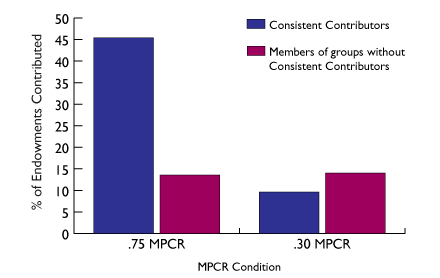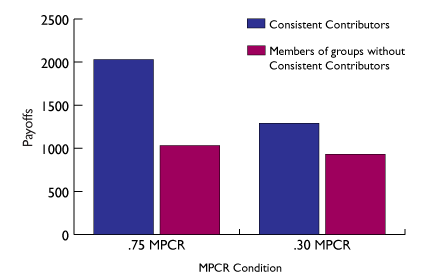Leadership Jan 1, 2010
Consistent Contributors
Putting the team first helps solve the “cooperation problem”
All groups need cooperation to survive. In business, sports, government, households, and many other arenas, success occurs only when members act for the common good. But whether dividing a restaurant bill fairly or setting tasks for a team project, an age-old problem rears its head when some of a group’s members cooperate less than others, choosing instead to pursue their own goals and mooching off the other’s contributions. How then do groups cooperate? What causes people to sacrifice their own interests for a larger goal? And why do some groups cooperate more than others?
J. Keith Murnighan (Professor of Risk Management at the Kellogg School of Management) and Kellogg alumnus J. Mark Weber (Assistant Professor of Organizational Behavior at the University of Toronto) investigated what they call the “cooperation problem” in a new study published in the Journal of Personality and Social Psychology. Murnighan and Weber point to the influence of a consistent contributor—a person who always contributes, regardless of others’ choices—in groups that cooperate most effectively.
“The consistent contributor looks for the collective good first and personal good second,” explains Murnighan. They initiate cooperation, leading the way for others to follow suit. The consistent contributor can drive the actions of others, acting as a catalyst for cooperation by altering the perceptions and actions of their fellow group members.
The Cooperation Problem and “Social Dilemmas”
The social sciences have long recognized that a small group of people can influence others for the common good&mdamdash;they help solve the cooperation problem. The cooperation problem plays out in a variety of situations, but especially when acting in one’s own interest rather than the group’s can net short-term payoffs. Business staff working on a shared budget often experience the cooperation problem, Murnighan points out, where individual interests can hamper progress toward a common solution, along with such public goods as National Public Radio, where listeners can still enjoy the broadcasts without making financial contributions.
Classic economic and academic studies of the cooperation problem paint a gloomy picture of group behavior. Research on rational choice theory, expected utility models, and game theory indicates that group members often succumb to the temptations of short-term personal rewards. Two studies on the “prisoners’ dilemma” have shown that consistent contributors set themselves up for potential, and even likely, exploitation.
Searching for the Consistent Contributor
Murnighan and Weber set out to discover both how and why group members cooperate—despite theories that predict otherwise. They began by examining data from a previous paper on group cooperation (Sonnemans, Schram, and Offerman, 1999). The original research was based on experiments with groups of four individuals. Everyone started each round of a repeated game with 60 cents that they could keep for themselves (the uncooperative choice) or contribute to a group account that would provide 40 cents to every group member, including themselves (the cooperative choice; Table 1). Payoffs increased as more people contributed, but withholding when others contributed would net a person an even higher reward. Still, many people contributed to the group account despite the temptation to keep the money and reap a larger personal payoff. Murnighan and Weber labeled those who contributed in every round as consistent contributors. Importantly, the consistent contributors emerged naturally in their initial observations: neither the group members nor the original researchers were tipped to the possibility of a consistent contributor.
After five rounds, the consistent contributors and their fellow group members actually gained more than the members of the other groups. Not only did they benefit financially but the consistent contributors also helped people who were “conditional contributors” to overcome fear and agree to act cooperatively. The consistent contributor groups also cooperated more when their returns from contributing were higher (Figures 1 and 2). “Consistent contributors aren’t blind contributors,” says Murnighan. “They surface more often when their contributions have more impact.”
Figure 1

Figure 2
Groups with consistent contributors cooperated more when the stakes were higher (Figure 1; MCPR stands for marginal per capita return, or the amount of a contribution a contributor receives back along with the rest of the group). They also received larger payoffs when the stakes were high and low (Figure 2).
Murnighan and Weber then examined how groups cooperate and what factors stimulated members’ cooperation. Specifically, they wanted to examine how consistent contributors could spur others into cooperative action despite short-term temptations to act for personal gain.
Consistent Contributors Create Cooperative Environments
Murnighan and Weber created a dozen four-person groups consisting of student volunteers. Everyone was given tickets that they could accumulate; more tickets meant a better chance in a lucrative lottery that was conducted at the end of the experiment. Each group member had repeated opportunities to keep their tickets or contribute them to a group account.
Some groups intentionally contained a consistent contributor who put all of his or her tickets into the common account, while the control groups did not. Although the participants did not know the identities of their fellow group members, they did know how much the others contributed.
As before, members of groups with consistent contributors gave more—and ended up with more total tickets—than those without one. Murnighan and Weber also noted that group members perceived the consistent contributors as more cooperative, less competitive, less self-centered, more group-oriented, and fairer. The consistent contributor sent a strong message that cooperation was appropriate and desirable. Additionally, consistent contributors elicited cooperation from both cooperatively and competitively inclined individuals—seemingly influencing other people’s actions regardless of their natural inclinations.
The consistent contributor’s social status also influenced the group’s dynamics. Murnighan and Weber constructed groups that consisted of either a “high-status” (a PhD student) or a “low-status” consistent contributor (a part-time secretary). Both of them elicited increased cooperation, but the groups with high-status contributors characterized their own actions more positively, seeing themselves as smarter, more engaged, and more rational.
Results Apply Directly to Work, Life Situations
“Everything we found was surprising,” says Murnighan. “Our research results counter what economists predict.” He points out that rational choice theory can actually become a self-fulfilling prophecy when everyone in a group is suspicious of each other’s motives. But, he added, “in a larger group, if someone consistently acts as a friend, it’s easier for others to act as friends and everyone benefits.”
“In a budget meeting, for example, each person wants the most for their division or department,” says Murnighan. “One person asks, ‘What’s in the best interest of the organization?’ The marketing department head sees that R&D is on the brink of a major breakthrough and says, ‘We can make do with what we had last year, so let’s contribute all of the increase to R&D.’ ”
Murnighan and Weber’s findings apply to a wide range of group situations in which people can choose to be consistent contributors—or run the risk of belonging to a group that doesn’t have a consistent contributor. Murnighan concludes, “Anytime you join a group, join one with a consistent contributor. And if there isn’t one, consider being one—not just for instrumental reasons.”
Weber, J. Mark, and J. Keith Murnighan. 2008. Suckers or saviors? Consistent contributors in social dilemmas. Journal of Personality and Social Psychology 95: 1340–1353.